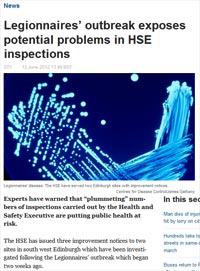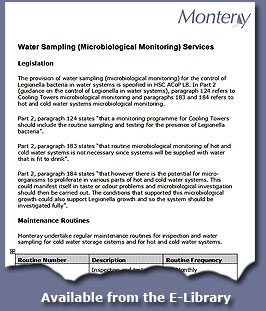Edinburgh Legionnaires’ Outbreak Exposes Potential Problems In HSE Inspections
Experts in Scotland have warned that “plummeting” numbers of inspections carried out by the Health and Safety Executive are putting public health at risk.
Following the Legionnaires’ outbreak in south west Edinburgh earlier this month, the HSE has issued three improvement notices to two sites which have been investigated.
The outbreak caused the death of two men, one of whom was a Fire Fighter, and a total number of cases stands at 95, with 48 confirmed as having Legionnaire’s disease and 47 suspected cases. The Scottish government announced this week that there now had been no new cases of the disease for the third day in a row.
The source of the disease has not been identified and due to various contributing factors it may never be known where the Legionella bacteria came from.
This of course means that Union Safety Reps must ensure quarterly safety inspections include examining H&S documentation from their employers in general, but also about water sampling, cleaning of any water tanks/towers, shower curtains, and arranging specialist regular inspections for Legionnaires.
 STV News website reported that, Alex Salmond was asked about the issue during First Minister Questions on Thursday of this week.
STV News website reported that, Alex Salmond was asked about the issue during First Minister Questions on Thursday of this week.
He said:
"Thankfully I can report there has been no new cases in the last couple of days. This is an immensely serious outbreak which has resulted in human tragedy. No stone will be left unturned."
He is also quoted as saying any criminal investigation would have to be completed before any wider inquiry took place.
Earlier this month the same website reported that the HSE has been unable to pin point a source of the Legionnaires’ outbreak in south west Edinburgh last month and that this has raised concerns with regard to the HSE operations and abilities, and the impact upon public health.
The STV news article reminded the public that ‘There is no requirement for the HSE to carry out regular scheduled inspections and the average gap between general HSE inspections is 12 to 14 years according Prospect, the union who represents HSE inspectors.’
The same article also says that Mike McDonald from Prospect, the union who represents HSE inspectors, confirmed that across the UK and in Edinburgh there had been a decrease in the number of inspectors available to do the work.
It quoted him directly as saying:
“There is more of a focus on safety rather than health. The HSE is severely run down with less capacity to deal with health issues.
General inspectors are experts in health and safety but focus on safety. For something like legionella you would need occupational health specialists to advise employers on what steps to take and what improvements are needed.”
Worse still, Mr MacDonald explained, says the news item, that the number of doctors who work in this area is now three for the whole of the UK when it used to be 30. The number of nurses has also decreased from 30 to 20.
These cuts, Mr MacDonald explained came from Government level and dictate the HSE work on a tight budget.
Explaining the HSE investigation process, the STV News website quotes Mr MacDonald as saying:
“There two type of investigation, proactive and reactive. Over the last 18months proactive investigations have been run down, some sectors only get investigated if something goes wrong including power stations such as Cockenzie and Longannet.
The process are targeted by industry sector and does not take into account specifics such as legionella meaning that some places that are just as likely to have it won’t get investigated.”
Mr MacDonald also explained that carrying out proactive investigations was costly to the HSE but that research has show this investment to have wider benefit to the population. He said:
“ Each pound that the HSE spends saves £2.50 elsewhere to the public including the NHS.”
 Meanwhile Professor Andrew Watterson head of the occupational and environmental health research group at the University of Stirling expressed criticism of the HSE and the way it has gone about dealing with this outbreak:
Meanwhile Professor Andrew Watterson head of the occupational and environmental health research group at the University of Stirling expressed criticism of the HSE and the way it has gone about dealing with this outbreak:
“I think the HSE ought to be able to explain why there are no regular inspections. We are at a point where we do not know who is responsible [for the Legionnaires’ outbreak] and the HSE should be able to explain their rationale and they cannot do that at this time.
There is no requirement for the HSE to inspect regularly but what we do know is that the number of inspections is plummeting.”
The STV News quotes him further:
“This has a human cost and an enormous economic cost including the burden on the NHS for the number of people in intensive care and of course there was one fatality.
“There is a need to inspect and keep checking on buildings and companies because the cost can be considerable in human and economic terms.”
A spokesman for the HSE, quite clearly following Tory-led Coalition changes to the HSE inspection regime; told STV News:
“The dutyholder has the legal responsibility to manage the risks created by their work activity. Guidance on how to manage those risks is freely available on our website. How often a dutyholder checks their cooling towers varies according to a number of factors, not a prescriptive schedule.
Companies are inspected by HSE in accordance with the risks their activities create and information about standards and performance which can include information about incidents and complaints. These inspections can be unannounced.”
You can read the full article by going to the STV News website article here
Source: STV News / Ivan Timson, Unite USR
See also the Elibrary Database for Monteray document on water sampling. Use search word 'water', without selecting category.


 STV News website reported that, Alex Salmond was asked about the issue during First Minister Questions on Thursday of this week.
STV News website reported that, Alex Salmond was asked about the issue during First Minister Questions on Thursday of this week. Meanwhile Professor Andrew Watterson head of the occupational and environmental health research group at the University of Stirling expressed criticism of the HSE and the way it has gone about dealing with this outbreak:
Meanwhile Professor Andrew Watterson head of the occupational and environmental health research group at the University of Stirling expressed criticism of the HSE and the way it has gone about dealing with this outbreak: